Trust the Road
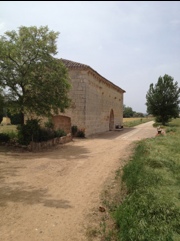 The long stone building stood adjacent to the Camino, like a ancient fortress, or a chapel – or both – offering protection to passing pilgrims for centuries. Inside, the cool air refreshed and inspired a mood of tranquility, a pause from the endless step-after-step of the road. Two men welcomed passers-by with gentle Italian accents, offering a bench to sit on, a break from the hot sun, cool water to drink and a tap to refill water bottles. I marveled at the nearly medieval setting: the vaulted ceiling like a church, the small, narrow windows set up high like a fortress, the furnishings like noble dining room. At one end, a rounded chapel, with religious images and artifacts of the Camino. At the other, bunk beds in a row against the wall. I’d read about this albergue in the guidebook I’ve been carrying by John Brierley, a mix of practical and mystical tips for walking the Camino de Santiago. The Ermita de San Nicolas is a small way station, without electricity and with only 12 beds. Brierley wrote that and if you can get a place on a mattress here you should consider yourself lucky.
The long stone building stood adjacent to the Camino, like a ancient fortress, or a chapel – or both – offering protection to passing pilgrims for centuries. Inside, the cool air refreshed and inspired a mood of tranquility, a pause from the endless step-after-step of the road. Two men welcomed passers-by with gentle Italian accents, offering a bench to sit on, a break from the hot sun, cool water to drink and a tap to refill water bottles. I marveled at the nearly medieval setting: the vaulted ceiling like a church, the small, narrow windows set up high like a fortress, the furnishings like noble dining room. At one end, a rounded chapel, with religious images and artifacts of the Camino. At the other, bunk beds in a row against the wall. I’d read about this albergue in the guidebook I’ve been carrying by John Brierley, a mix of practical and mystical tips for walking the Camino de Santiago. The Ermita de San Nicolas is a small way station, without electricity and with only 12 beds. Brierley wrote that and if you can get a place on a mattress here you should consider yourself lucky.
It was just before noon. I’d walked since 6:30 am but with more breaks than usual, covering about 18 kilometers, less than the usual daily distance, which might range between 22 and 29k. I was in good form, though, not yet ready to stop for the day. I rested there for a while, just to take advantage of the ambiance, but before long I stood up, grabbed my walking sticks from against the wall and took to the road.
Just beyond the albergue, a stone bridge crossed the rio Pisuerga and I stopped midway and looked back. I wanted to keep walking, but there was something back there, something calling me, an opportunity to stop for an afternoon in the quiet and reflect, the serenity of the setting, the experience it might hold for me. I mulled this over for at least ten minutes, standing there on that bridge.
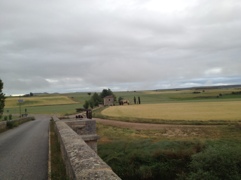
A German woman, crossing the bridge, stopped to talk with me. I told her my dilemma. “If you are torn, then go back,” she said. “I stayed there when I did the Camino before, and it was a special night.”
That was all I needed, a slight nudge to break the equality of my options. I turned and walked back, against the traffic of pilgrims. Remarkably, in that 50-meter stretch, I met several friends I’d made over the last days. An American couple I’d bunked beside at the albergue in the one-horse town – literally, it had one church, one bar/restaurant, one funky but cozy albergue – of San Juan de Ortega. Just behind them, two Spanish guys who called themselves my dos Sanchos, after Don Quixote‘s sidekick, with whom I’d had a long, late lunch the day before in Hontanas, and then a picnic that same night when the older Sancho‘s wife and daughter showed up, like a pit crew, with a huge feast, an impressive spread of homemade tortilla, fried pig’s chin (very tasty), and an array of salads and bread and wine we shared from a wineskin pouch. The younger Sancho, whose wife will bring his horses to Leon so he can finish the Camino on horseback, urged me to go on with them, offering the promise of another pleasant lunch together. But I knew – and I was literally walking against the tide of pilgrims – that I needed to stay in this remote, roadside station. I waved goodbye to all these fellow walkers, such fast friends we’d become in such a short span of time, and retraced my steps to the albergue, presenting myself to Augusto, whom I’d spoken with before, asking him if it was too early to request a place in the ermita that night.
“Yo te visto,” he said. He’d seen me stop and ponder my decision on the bridge. He took my backpack from me and carried it into the building, even though it was earlier than the usual hour for accepting boarders.
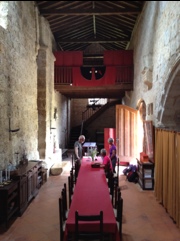
I sat at the table while he explained the rules and procedures, nothing unusual from any other albergue I’d stayed at, except here there was no fee, only a donation if I was able to contribute. Because it was so early in the day and I was the first pilgrim to ask to stay, I had a very private shower, despite the communal bathrooms in the back, and washed all my clothes in a big basin and hung them on the line next to the red flannel mattress covers that were flapping in the wind, drying after being washed after the previous night’s pilgrims. I’d noticed them hanging on the line when I approached, they reminded me of my mother’s sheets. I longed to help fold them, but I’d learned right away – when I’d offered to help – that the guests were not to do any work at the albergue.
“A pilgrim’s work is to walk and reflect,” Augusto said. “Our work is to feed you and give you a place to wash and sleep.”
I spent the afternoon writing, reading and resting. I sat in front of the building, watching pilgrims come down the road and peek in. You could see they were impressed with its mystical quality but also intimidated by its solace and simplicity. But by the end of the afternoon, 11 of the 12 cots were filled. The last person to walk down the road, with the absolute intention of finishing her day here, the Romanian woman whose wisdom I wrote about in my last post. Our hug was fierce, we had not seen each other since we had that conversation on the trail, days before.
At 7:30 pm, our hosts rang a bell and escorted us to the rounded chapel-like end of the long room. Twelve chairs were arranged in a semi-circle. The two Italian men donned shoulder-length brown capes with large scallop shells attached, the symbolic uniform of their confraternity. They talked about the privilege of being in service to pilgrims, a long winded explanation in Italian – there were six Italian speakers staying that night – and shorter translations in English and Spanish. To symbolize this service, they produced a metal basin with a pitcher of water, and one by one, washed our feet. The gesture 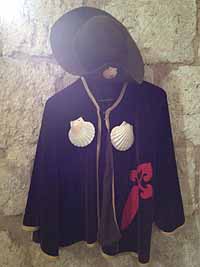 surprised and moved each one of us. We were then invited to be seated at the table, set for our dinner, lit only by candles. A huge bowl of pasta with red sauce – prepared on a gas stove since was no electricity in the albergue – was placed at each setting. As much as I love Spanish food with its eggs and pimentos and potatoes, the pasta was a nice change, served with a generous amount of imported parmesan. The red wine was plentiful, second helpings thrust upon us, good conversation and laughter, a hearty meal for belly and the spirit.
surprised and moved each one of us. We were then invited to be seated at the table, set for our dinner, lit only by candles. A huge bowl of pasta with red sauce – prepared on a gas stove since was no electricity in the albergue – was placed at each setting. As much as I love Spanish food with its eggs and pimentos and potatoes, the pasta was a nice change, served with a generous amount of imported parmesan. The red wine was plentiful, second helpings thrust upon us, good conversation and laughter, a hearty meal for belly and the spirit.
As the sun set, we prepared for bed. When the last pilgrim crawled into a bunk, Augusto blew out the one candle still burning. I did not move again until the morning, when the noise of breakfast-in-preparation woke me gently and I rose for a cafe con leche and bread and Nutella, before setting off again, slightly sad to leave but thoroughly composed, light-footed, ready to walk.
~ ~ ~
Last week, on my return trip to the Camino, I was at the bus station with an hour to kill between transfers, so I combed through my guidebooks and sketched out how I might walk over the next days. I calculated distances for each day and made reservations at charming little hotels and casas rurales, mapping out a very nifty little plan.
I have cancelled all but one of those reservations.
Each day, I’d realize that I wanted to stop sooner because a town had a certain charm, or I’d want to go further because I had the stamina to keep walking. I’d call to cancel my reservation with an apology, and I’d always find some other perfect place to sleep, in a room with a dozen others or by myself, it was always the right choice.
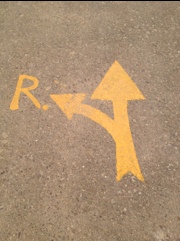
I think it took me this long to surrender to the Camino. Plans are nice to have, but on this path they are unnecessary, or even burdensome. I finally learned to trust, fully, that wherever I end up, it will be the right place, that there always a shower, a meal and a bed. A Dutch man, doing the Camino on his bicycle, told me how he rode into a small town one evening and there were no beds available at any hotel or albergue. A local family took him in their guest room.
So I start off each morning with an idea of where I might want to end up, but otherwise let my feet tell me when to stop, or when to keep going. One day I walked 37k because it felt so good to be moving. The scenery is beautiful and I am fully aware of it – I am part of it. I wish I could live my life this way, trusting the road so fully, not trying to plan or control it, but just to be on it. Of course, I should mention that it took some clever planning to clear the decks so I could do the Camino. There’s the rub.
I was musing about all this when I came upon a small cafe-bar, deciding to stop off for a lemonade. There was an open wifi network there, so I checked my email. I was so immersed in the messages from home that I hardly noticed the four sloppy-drunk men at the bar, until one of them came over and pretended to be reading over my shoulder. I knew how to handle it: playfully rebuffing him at first, then, when that didn’t work, making a fiercer boundary until he left me alone. I managed it without a big fuss, but it interrupted my mood. I guess sometimes you can’t trust the road, at least not completely.
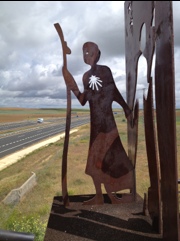
But I want to. I want take this trust back home with me. I want to transmit it to Short-pants and Buddy-roo, this feeling of having faith in whatever unfolds, making the best of what is, realizing that among all the choices you have in any given moment, most of them will be exactly the right choice, if you show up for it fully committed. But I also want to help them understand when not to trust so fully what the road brings, how to set your own course, how to draw boundaries, how to protect your open, tender, heart while taking on four drunk men in a bar. Or how to trust the clarity of your own voice amidst the cacophony of others crowded around you. I want them to be able to trust the road, but also to know when to trust themselves instead.
It has taken me 18 days of walking and 400 kilometers – that’s 250 miles – to slow down enough to hear my own voice, let alone to trust it. I’m just over halfway to Santiago, and in a few days I’ll have to head home, and leave the rest of the Camino for another time, next fall or next year. I don’t know what’s going to happen when I go back to the day-to-day of my life, to the bombardment of information, obligations and responsibility. Can I stay in this cool Camino groove? Can I bring its rhythmic calm back with me? Can I trust myself – and the road – and keep walking the walk?


June 5th, 2012 at 11:23 pm
YES! With a cool Camino Groove cocktail, followed by a rhythmic calm bath …. xxoo Beautiful essay.
June 5th, 2012 at 11:34 pm
trust. sometimes i wonder if it’s a virtue. great post. and happy belated birthday.
June 6th, 2012 at 5:56 am
Short pants was right when she said, “You’ll have a good walk.” What a walk it’s been!
Can you trust yourself? I think you already are. I like the rhythm here, “I don’t know what’s going to happen when I go back to the day-to-day of my life, to the bombardment of information, obligations and responsibility.” The question on the page, is open. You know it will be a bombardment, and yet your question is open. I love that.
Jill Bolte-Taylor in her book, My Stroke of Insight–her recovery functioning as a Camino–learned that we always have a moment when we can choose our response. She describes the bio-chemistry of that moment, then offers this suggestion: “Pay attention to what you are thinking, and then decide if those are thoughts that are creating the kind of life you want created,” she says. “And if it’s not, then change your thoughts. It’s really that easy.” Bio-chemically, the space for this choice is real.
The you that studied the guidebook, made, and then canceled the reservations. That’s you in Camino flow, making that choice. As was the moment when you stood on the bridge, trying to decide which way to go. And, you found yourself as you walked back from the bridge–running into folks you knew–present to two good choices.
To me, that’s mindfulness. Dealing with the drunks in the bar, and getting back to the Camino. That’s the same thing. All the things you want to and are already teaching Buddy-roo, and Short-pants. You’ll continue to do them. After 18267 some odd sunsets, and 400 kilometers of walking, you know your voice in a different way. One, that I don’t think you’ll ever lose sight of (even if you have a green-vested moment, or two, or four).
I’ve said this before. It’s an honor to walk with you.
June 6th, 2012 at 3:05 pm
What a wonderful birthday gift to give yourself. Like Paris, the Camino is a movable feast. You can, at any ‘crazy-turn the volume down-I can’t take it anymore’ moment, retreat to the inner peace and thoughfulness that the Camino has gifted to you. The pre-Camino You can never hold up to the post-Camino You who has empowered herself with the blessing of peace. It has been a pleasure walking with you.
June 6th, 2012 at 7:30 pm
I am distinctly intrigued by this journey of yours.
June 6th, 2012 at 8:49 pm
Oooh! It is good to linger and tread more softly. You are passing through hallowed history. In the Middle Ages pilgrim shelters often only had 12 beds – the number of the Apostles – and the 13th C chapel (which used to belong to the Order of St John) – follows in that tradition.
The original bridge was built by Alfonso VI to unify the kingdoms of Castile and León and is mentioned in the Codex Calixtinus of the 12th C. I’m sure you can feel the souls of pilgrims past through the soles of your shoes!!
June 12th, 2012 at 5:05 pm
“…realizing that among all the choices you have in any given moment, most of them will be exactly the right choice, if you show up for it fully committed”. That’s it. We have so many choices and often they are all good ones. Happy belated birthday! So great to “live” your pilgrimage with you! love, amy
June 15th, 2012 at 4:23 pm
Thank you so much for posting this! I stayed in this albergue a couple of weeks before you. LIke you, I stopped earlier than I needed to, because it just felt right. The door was locked, with a sign saying “Open at 4” on it, so I sat on the bench outside, wrote letters, chatted with people as they came down the way, and waited.
I’m really glad I did. It was one of the highlights of my camino. An extraordinary, wonderful evening filled with kindness and generosity. Yes to the generous parmesan, the generous wine, and the chocolate, which was generous to excess. They even gave us emergency chocolate after breakfast, to carry on our way. I still have mine.
Thank you, also, for posting your experience of relaxing and simply trusting the way. That was my experience, also. I’m normally a meticulous, obsessive planner – every detail is agonised over. So to simply walk, not knowing where I would spend the night, but trusting it would all work out, was lifechanging.
And it always did work out. The way was very kind to me, giving me what I needed, sometimes before I even knew that I needed it. That’s a sentence I would have mocked before I set off, but it was true.
I remember sitting in a bunk in an albergue somewhere between Leon and O’Cebreiro, and feeling utterly at peace. It’s a feeling that maybe only another pilgrim would understand, and you capture it perfectly. Buen Camino!